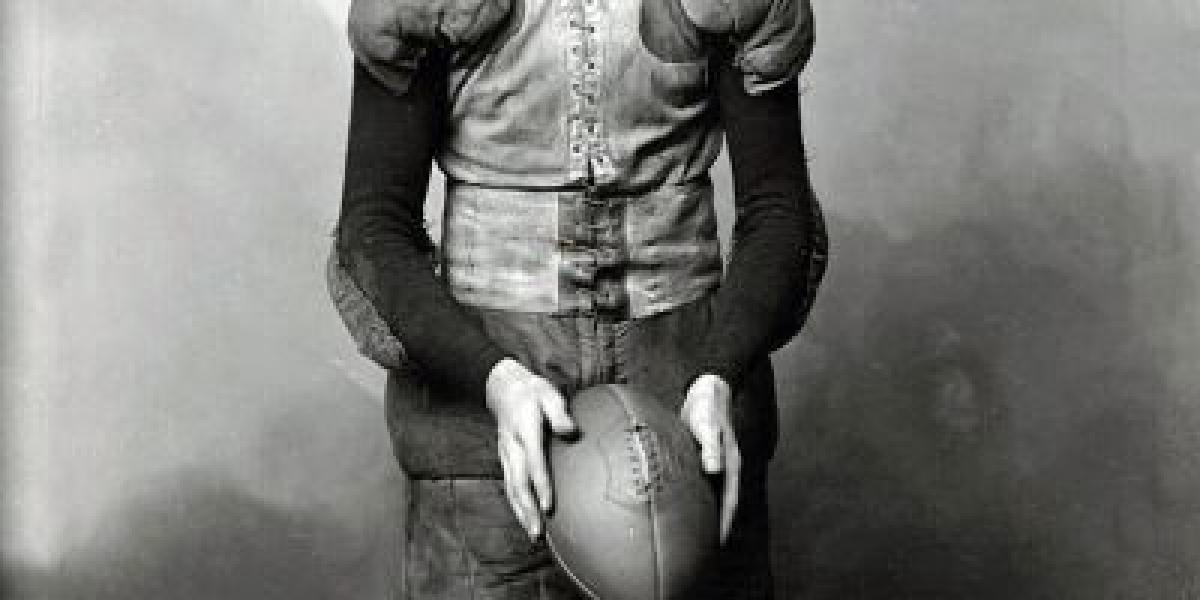Born in Australia on March 17, 1872, Pat became a legend in his home country for his athletic ability. After the start of a promising career of Aussie football, the youngster had ambitions of getting an education at Oxford University. On his way of furthering his education, O’Dea took a detour stop in the States to visit his brother Andy O’Dea at the University of Wisconsin, where the elder O'Dea served as the coach of the crew team.
In one 1899 game, Pat showed some football versatility as he returned a kick 90 yards for a score and added four field goals to the tally. He was a three-time All-American, a team captain, and a key figure in Wisconsin's rise to national prominence.
In 1899, O'Dea showed his moxy in a game against mighty Michigan. Both teams entered the late season game, held on Thanksgiving day, with only a single loss. Michigan's strategy was to take Wisconsin's best weapon, O'Dea, out of the game. The big, athletic Wolverine guard Richard France was one of the main characters deployed to execute the strategy, and he laid some viscous and on-the-verge-of-dirty hits on the Badger star player. Once O'Dea figured out France's intentions, the Aussie warned the Michigan guard to stop the activity or there would be trouble.
On consecutive punts, France charged O'Dea after the boot "like a battering ram," on the second of these occasions, O'Dea laid his fist across the Michigan guard's jaw, knocking him out to a sprawling condition on the ground. The Ref witnessed, and O'Dea was rightfully ejected, but he had already done enough damage, as the Badgers won the contest 17-5.
However, O'Dea's coaching career proved more tumultuous. After leading Notre Dame to a winning record, he was controversially fired for playing against his team in an exhibition game. He bounced around, coaching at Missouri and Stanford, but restlessness followed him. In 1917, O'Dea vanished, leaving behind a trail of speculation. Theories ranged from wanting to escape football fame to joining the Australian army in World War I.
He resurfaced in 1934, living under a pseudonym in California. While the reasons for his disappearance remain shrouded in mystery, it adds a layer of intrigue to his legacy. Was it a yearning for anonymity, a fallout from the coaching world, or something more?
Pat O'Dea's career may not have been conventional, but its significance is undeniable. He pioneered American football kicking, was a dominant player for Wisconsin, and symbolized the sport's burgeoning international appeal. Walter Camp described this athlete from "Down Under" as the man who “put the foot into football as no man has done or probably ever will do.” His enigmatic disappearance adds a layer of fascination to his story, making him a unique figure in the annals of football history.
Here's a snapshot of O'Dea's career:
✦ Dual-Sport Star: O'Dea's athletic journey began in his native Australia, where he excelled at Australian Rules Football for the Melbourne Football Club.
✦ American Adventure: In 1898, O'Dea crossed paths with American football at the University of Wisconsin-Madison. He quickly emerged as their star fullback, showcasing his kicking prowess, a valuable skill in those days when fullbacks often handled punting and placekicking. He captained the team in 1898 and 1899.
✦ Coaching Stint: After graduation, O'Dea took on the head coach role at Notre Dame (1900) and the University of Missouri (1902), compiling a 19-7-2 record.
✦ Pioneering Kicker: O'Dea's kicking skills were considered top-notch for the era, earning him the nickname "Kangaroo Kicker." He helped introduce the placekicking style, which is more prevalent in Australian Rules Football, to the American game.
Impact and Legacy:
While O'Dea's playing career was brief, his impact is notable:
✦ Early Football Specialist: He was one of the first players to specialize in kicking, a vital role in the evolution of the sport.
✦ Bridging the Gap: O'Dea's experience in Australian Rules Football and American Football might have helped bridge some stylistic differences in the sport's early days.




